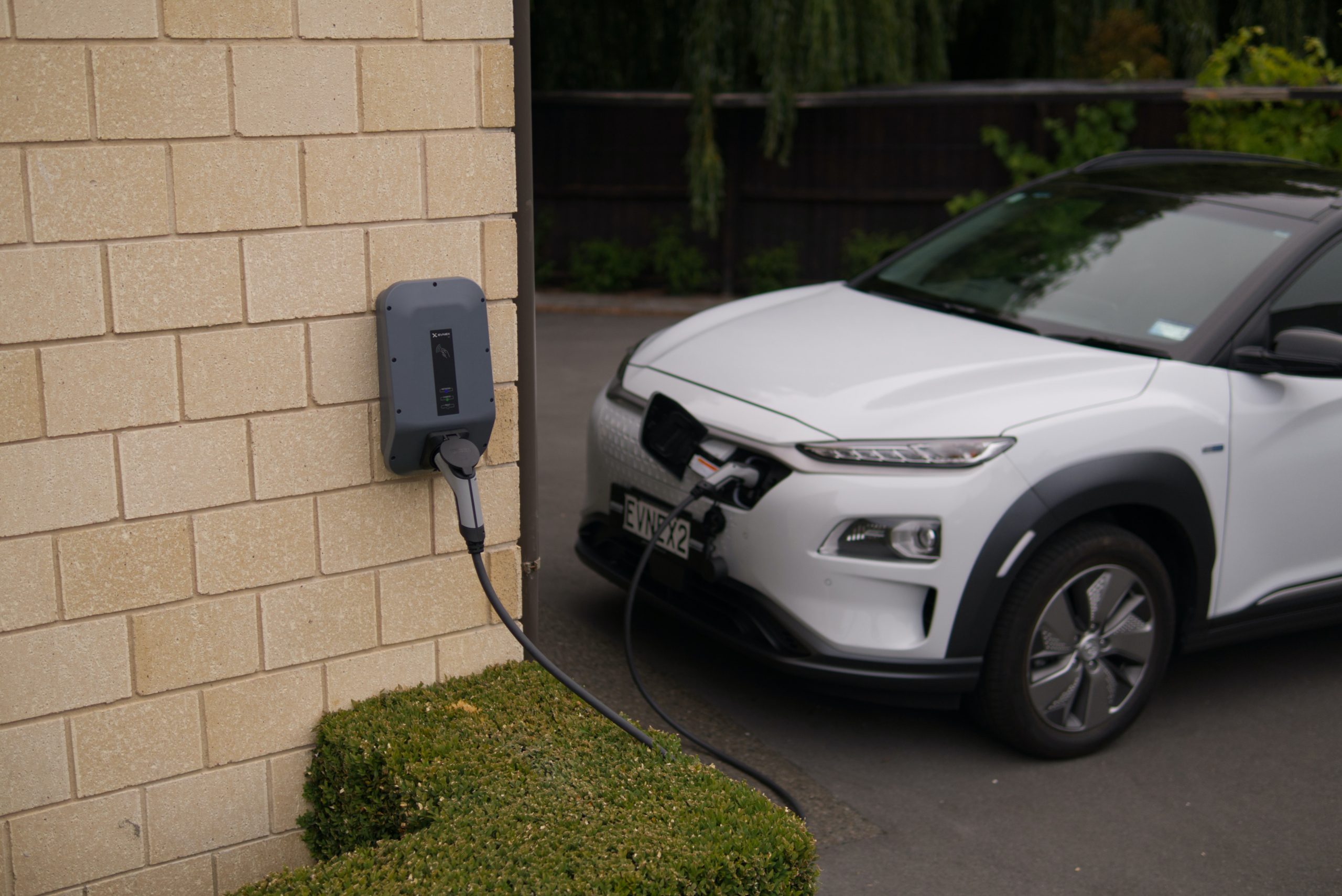EV ownership is rising every year and all signs point to the trend continuing. New electric vehicle owners wondering about installing a home EV charger. We’ll cover home EV charger installation, along with charger costs, and explain what a Level 2 charger is, along with a few other facts.
What is a Level 2 Charger?
While there are other types of EV chargers, Level 2 units are becoming the most commonly used for home charging. The charger resembles a small box that is connected to a 240V outlet or hardwired into the wall. The charger comes with a cable and plug that connects to the electric vehicle. One end plugs into the outlet and the other into the EV. A benefit of Level 2 chargers is the units are compatible with all EV models currently on the road.
Level 2 charging speeds vary according to electrical current and amperage. Not all EVs can handle higher charging speeds, so it’s something to consider. Most electric vehicles are compatible with 32A, which gives you around 25 miles of range per hour of charging. Some Level 2 chargers work with 50A, giving you around 37 miles of range per hour.
How the charger or EVSE works is pretty basic. The chargers take AC power from the home outlet and convert it to DC power. (Electric batteries use DC power.)
Other Types of EV Charging Stations
Two additional types of EV charging stations are Level 1 and Level 3 units.
Level 1 Chargers
Level 1 chargers plug into a standard 120V outlet. These are the least expensive, the units are included with an EV purchase, but they are also extremely slow. For every hour of charging, you get a range between three and four miles. Level 1 chargers are fine for limited driving range, but many homeowners want something faster.
Level 3 Chargers
Level 3 chargers can provide around 200 miles of range after an hour of charging. Some only require around 15 minutes. These chargers are large, powerful, and expensive. The units are rarely found in homes, instead, they are often located in public charging spaces. Think of Level 3 charging as a trip to the gas station, something you do once or twice a week.
Choosing the right home charger that will fit your lifestyle and give you the EV range you need can be a stressful endeavor. That’s why in our blog, Choosing The Right Home EV Charger for Your Needs, we break down the different changers and look at charging speeds, supply, installation locations, safety, savings, and over all cost.
Installing Your Home Charging Station
So how do you install a home EV charger? Unless you are a licensed electrician, you need help from a professional. It’s never a good idea to start playing with your home’s electric wiring unless you have training and experience.
Some homes may need to install a 240V outlet in or near the garage. It’s also recommended to have a professional electrician install the EV charger into an existing outlet.
Costs of Installing a Home EV Charger
Every home charger installation is different, and that includes the cost. The type of EV charger, Level 2 units are more expensive than Level 1 stations. You may also have to pay permitting costs and cover expenses for electrical materials. Don’t forget about labor costs. Professional electricians’ fees vary, and finding one with EV charger experience can be difficult depending upon where you live.
Apogee Charging Solutions has dedicated electricians that specialize in EV charger installations for both commercial and home use. We offer our clients a one-stop-shop for all of their EV charger needs, from product to final installation and everything in between.
How Much Does it Cost to Charge an EV?
You will pay for the electricity used to charge your electric vehicle. While the increase in your utility bill may be alarming, it’s less than you are spending on gasoline. Electric vehicles also require less maintenance, saving you additional money.
Electricity rates vary by state and even the time of day. Utility companies charge more for electricity during peak hours. However, here’s a look at average EV charging costs compared to gasoline from the U.S. Department of Energy Information Administration.
- California:
- average price of electricity = 18¢/kWh.
- average price of gas (regular) = $4.64.
- cost to provide 40 miles of electricity for a Tesla Model Y = $2.02;
- cost to provide 40 miles of fuel for a Lexus RX = $8.44.
- Florida
- average price of electricity = 10.06¢/kWh.
- average price of gas (regular) = $3.345.
- cost to provide 40 miles of electricity for a Tesla Model Y = $1.13;
- cost to provide 40 miles of fuel for a Lexus RX = $6.08.
- New York
- average price of electricity = 14.87¢/kWh.
- average price of gas (regular) = $3.547.
- cost to provide 40 miles of electricity for a Tesla Model Y = $1.67.
- cost to provide 40 miles of fuel for a Lexus RX = $6.10
- Iowa
- average price of electricity = 8.97¢/kWh.
- average price of gas (regular) = $3.151.
- cost to provide 40 miles of electricity for a Tesla Model Y = $1.01;
- cost to provide 40 miles of fuel for a Lexus RX = $5.73.
The comparisons between gas and electric vehicles highlight the savings EV owners get with their electric vehicles.
Contact Us Today to Learn More About Installing a Home EV Charger
Whether you are looking for more information on product selection or you need a professional electrician to install your Level 2 charger. Contact us today to see how we can help. Call 484-816-2076, email [email protected], or schedule a call that fits your needs by clicking the button below.








0 Comments